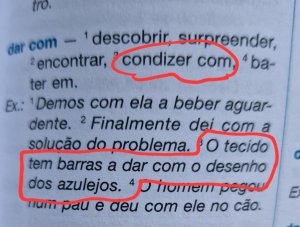This is an updated version of my brainstorm about the four intractable problems (“4 evil exes”) I identified before my first B2 exam, trying to wrestle with the subject by putting it into a post, because explaining something to someone else is usually a pretty good way of learning it yourself. Since I wrote the first version, and then my second my understanding as developed a bit so I thought I’d update this to solidify that knowledge. Just ignore version 3 – it was just like 2 but with some new mistakes. In fact, in general, remember I’m writing this mainly as a way of helping my own understanding and you’d be crazy to believe anything I say. If you’re confused, go and ask a proper teacher.
Quite often in Portuguese, the word “Se” crops up in unexpected places, hanging around verbs, and it isn’t always clear what it’s doing there. Here is a breakdown of its possible uses,
As a word meaning “If”
This is the odd one out, really, and the easiest one to spot. In this case, the word happens to be hanging around the sentence and maybe the verb will have to change as a result but in this case it’s not really strongly interacting with the verb, so you can just translate it in your had as “if” and move on. If you’re at B2 level and don’t already know about the subjunctive imperfect, go and have a read. Otherwise, forget it.
Não sei se na vossa casa sobrou muito chocolate dos ovos de Páscoa?
Or
Se tivesse dinheiro o suficiente, eu encheria a casa de livros
As a reflexive pronoun
Se is one of the pronouns used in the construction of reflexive verbs. Reflexive verbs. Reflexive verbs are just verbs in which the subject and the object can be the same thing. For example, “I can dress myself”. I am the one who is doing the dressing, and I am the one being dressed, so it’s a reflexive verb. In Portuguese and other romance languages, reflexive verbs seem a bit counter-intuitive.Sometimes they are used in situations you wouldn’t expect and sometimes they mean “each other” instead of “oneself”.
Of course, it’s not always “se”. The complete set of pronouns looks like this:
- me
- te
- se
- nos
- vos
- se
Here are some examples of reflexive verbs:
| Standard | Meaning | Reflexive | Meaning |
|---|---|---|---|
| lembrar | to remind | lembrar-se | to remember |
| amar | to love | amar-se | to love one another |
| apaixonar | to fall in love | apaixonar-se | to fall in love with each other |
| deitar | to lay (something) down | deitar-se | to lie down |
| levantar | to lift | levantar-se | to get up |
| beijar | to kiss | beijar-se | to snog each other |
| banhar | to bathe (someone) | banhar-se | to have a bath |
| chamar | to call (someone) | chamar-se | to be called/named |
| lavar | to wash something | lavar-se | to have a wash |
| sentar* | to put someone in a sitting position? | sentar-se | to sit down |
| sentir | to sense something | sentir-se | to be conscious of something |
| voltar | to turn, return, re-do | voltar-se | to turn around |
| servir | to serve | servir-se | to help oneself to |
| vestir | to dress someone | vestir-se | to get dressed |
| ** | suicidar-se | to kill oneself | |
| cortar | cut | cortar-se | to cut oneself |
| achar | to find | achar-se | to find oneself |
*sentar apparently exists but it’s not used often
**When I first wrote this article I confidently said that “suicidar” couldn’t exist in a non-reflexive form since you can’t suicide someone else. However, you’ll occasionally come acorss this sort of thing:
https://twitter.com/OhFazFavor/status/774212893189496832?s=09
which my teacher tells me is just crap grammar.
And here are a few that need pronouns with them (to call back to this post)
| Infinitive | Meaning |
|---|---|
| aproveitar-se de | to take advantage of |
| convencer-se de | to convince oneself about |
| lembrar-se de | to remember about |
| esquecer-se de | to forget about |
| queixar-se de | to complain about |
| rir-se* de | to laugh about |
| decidir-se a | to decide |
| dedicar-se a | to dedicate oneself to |
| acostumar-se com | to get familiar with |
| parecer-se com | to resemble |
| surpreender-se com | to be surprised by |
*surprisingly, rir is supposed to be reflexive most of the time. You’re not laughing something, you’re just laughing. There’s nothing on the receiving end of the verb. People often use it non-reflexively but that’s an informal use.
Reflexive pronouns usually go after the verb in european portuguese (but there are exceptions such as negatives, questions and after words like “que”. In Brasil they just whack it in front of the verb, the dirty beasts.
If it’s a compound verb, you have options. With ir+infinitive, the pronoun can attach either to the stem or to the auxiliary
Ele vai-se encontrar com ela.
Ele vai encontrar-se com ela.
but with ter+participle it has to go after the auxiliary
Ele tinha-se separado de sua namorada.
Ele tinha separado-se de sua namorada.
Note that we usually think of reflexive verbs as “bouncing back” to the subject, so the subject and the object are the same person, like when we say in english “I’ve wet myself” instead of “I’ve wet the baby’s head”. This isn’t always true as we can see from the list above, and we can also think of it as having some sort of mutuality
Pedro e Maria deram-se as mãos.
They held each other’s hands, not their own hands.
As an impersonal pronoun
When discussing a generalised situation – like the english “one”, described in this Portuguese grammar article as “sujeito indeterminado” (unknown subject)
One shouldn’t drink too much
It’s not used very often these days because it’s usually felt to sound a bit pretentious, so people will usually use “you”
You shouldn’t drink too much
which of course sounds as if the speaker is admonishing their listener directly to lay off the booze. This is a bit of a loss to the english language, because being able to speak in general terms is useful and avoids a lot of misunderstandings.
The Portuguese haven’t made this mistake and use “se” as an impersonal pronoun, which makes more sense, I think.
Here’s an example that really threw me because it was used with the verb “ser”
Há uma frase inglesa que está sempre presente: “I had to smile“. Significa que se foi obrigado a sorrir
Se foi means “one was”. Some person was obliged to smile.
Similarly
Sabia que é preciso pagar para se ser santo?
I was confused because it looks like “Saint” is a noun and it’s the object of the verb so it shouldn’t need the se, but santo is more like a condition – an adjective. “Did you know that you need to pay to be [holy]” not “Did you know that you need to pay to be [a saint]” Now this seems to be a bit subtle but it seems to be a way of amphasising the verb as a verb. It’s optional, in other words, but it sounds better. Bloody hell…
Ou lá o que se faz no Facebook
Or whatever happens on facebook.
Here’s a nice example that’s a lot harder to translate but pretty.
O êxito do celebre poema de Florbela Espanca deve-se à maneira como trata o verbo amar como intransitivo. Ama-se como chove. Perguntar: “Mas amar quem?” é como perguntar: “Chove quem?”
 OK, I said it would be hard to translate but I’ll have a go. Amar is normally a transitive verb (X loves Y.) but here Miguel Esteves Cardoso praises Florbela Espanca for the way she uses it intransitively (X loves.) and he uses “se” to talk about how people in general love.
OK, I said it would be hard to translate but I’ll have a go. Amar is normally a transitive verb (X loves Y.) but here Miguel Esteves Cardoso praises Florbela Espanca for the way she uses it intransitively (X loves.) and he uses “se” to talk about how people in general love.
The success of the well-known poem of Florbela Espanca is owed to the way in which she treats the verb “to love” as an intransitive. One loves like it rains. To ask “but love who” is like asking “rain who?”
Um… well, I hope I’m not too far off the mark there. Incidentally, I think this is the poem he means.
Notice that he also uses “deve-se”, and that brings me onto the next type of se:
As part of a sentence in the passive voice
Passive voice is when you use a phrase like “it was done”, “mistakes were made”, “a murder was committed” instead of the more direct “He did it”, “We made a mistake” or “Someone committed murder”. I quite like this form of words and use it in writing but some people find it vague and evasive, and for that very reason it’s popular in political speech and PR briefings.
O êxito do […] poema […] deve-se… means “The poem’s success is owed…” [or “is due to”]
“O livro publicou-se” means “the book was published”
Em Portugal bebe-se muito café (A lot of coffee is drunk in Portugal)
or
Fala-se Inglês (English is spoken here)
and in the negative…
Não se fala Espanhol no Brasil
One context that will be familiar to a lot of portuguese learners is this from the introduction to some of the Diálogos in the Practice Portuguese Podcast:
As conversas que se seguem são baseadas em factos verídicos
“The conversations that follow are based on true facts.”
But which one is it?
Now, it’s not always clear whether a phrase like
Em Portugal bebe-se muito café
should be translated as “a lot of coffee is drunk” (passive voice) or “one drinks a lot of coffee” (imperonal pronoun) but, really, is there a lot difference?
Apparently the key is whether you can replace it with Ir+participle. Passive verbs described in the presvious section are known as “passiva sintética” to distinguish it from “passive analítica” which is where you say something like “Muito café é bebido em Portugal” and that works, so this is a passive voice construction. The only difference it seems to make is that in passive voice, the verb changes with the subject
“Muitos pasteis são comidos em Portugal” => “Comem-se muitos bolos no Brasil”
…which means it’s reflexive, so if many cakes are eaten, it needs to be comem-se, not come-se.
But in the example given on the web page….
“Trabalha-se muito por aqui” can’t easily be transformed in the same way without changing the meaning “É trabalhado muito por aqui.” It doesn’t really work. So it won’t ever need to become “Trabalham-se muito por aqui” or “Trabalhas-te muito por aqui”. We don’t know who the subject is so we won’t ever make the verb agree with the subject.
I think in the more ambiguous cases, it’s best not to worry about translating and just read it as it is, and not think of it as directly equivalent to either english form. The upshot of both sentences is that an awful lot of coffee drinking goes on in Portugal. This is a good way of training yourself not to automatically translate everything into english but instead just try and absorb the meaning from the portuguese words.
For Emphasis?
I’t’s not quite clear how phrases like “Vou-me embora” fit into this. The subject is known and it’s not really passive. My teacher said it’s to do with emphasis, and the fact that it’s intransitive (ie, it’s a verb that just happens without needing to happen to something) probably helps too.





